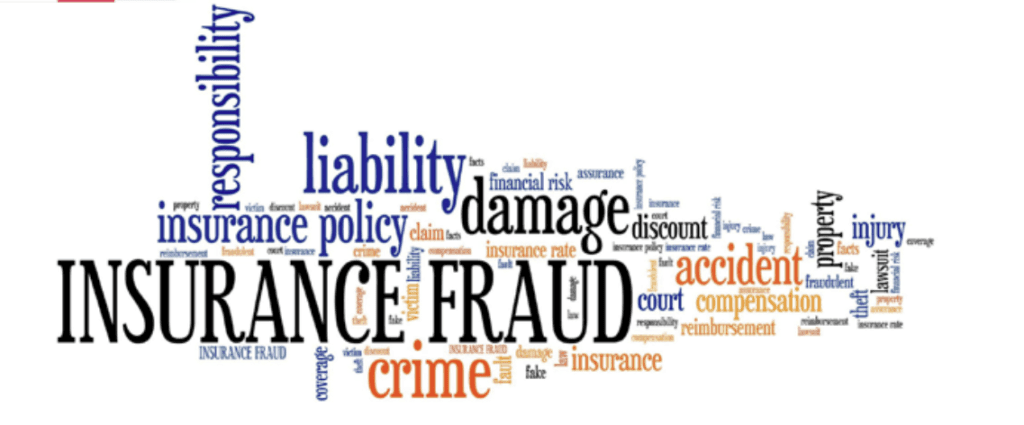In recent years, Ghana’s insurance industry has faced a significant challenge: a surge in insurance fraud, which is also a growing concern worldwide. Insurance fraud is an elaborate scheme to deceive insurers and cash in on substantial payouts or an intentional deceit carried out against an insurance company by policyholders, applicants, third-party claimants, insurance brokers, agents and providers, with the aim of gaining financial benefits. This trend, not only undermines the integrity of the industry, but also erodes the trust of consumers. However, amidst these challenges, there are opportunities to restore confidence and strengthen the sector.
Insurance fraud encompasses various deceptive practices, including falsifying claims, staging accidents, and misrepresenting information.
In Ghana, the rise in insurance fraud can be attributed to several factors; economic pressures, inadequate regulatory oversight, and gaps in enforcement have created an environment ripe for fraudulent activities. Like many other countries, Ghana faces economic pressures that can drive individuals and businesses to engage in fraudulent activities. Economic instability, unemployment, and poverty may incentivize some individuals to resort to insurance fraud as a means of financial gain, particularly when faced with mounting financial burdens. In addition, a lack of public awareness about the prevalence and consequences of insurance fraud exacerbates the problem in Ghana.
Many consumers may not fully understand the impact of fraudulent activities on the insurance industry, premiums, and the overall economy, as a result, they may unwittingly participate in or fall victim to fraudulent schemes.
Damaging Consequences on the Industry and Consumers
The proliferation of insurance fraud has far-reaching implications for both the insurance industry and consumers.
For insurers, fraudulent claims lead to financial losses, increased operational costs, reputational damage etc. The influx of fraudulent claims places a strain on the resources and capacity of insurance companies, diverting attention away from legitimate claims processing and customer service. This strain can lead to delays in claims settlement, customer dissatisfaction, and increased regulatory scrutiny.
Insurance fraud cases can severely tarnish a company’s reputation, eroding the trust and confidence of customers, potential investors and business partners. This erosion of confidence discourages individuals and businesses from investing in insurance products, leaving them vulnerable to financial risks.
Also, the negative publicity surrounding fraudulent activities can damage the brand image of insurance companies, making it more challenging to attract and retain customers in an increasingly competitive market.
On the other hand, Insurance fraud contributes to higher premiums for consumers, as insurers pass on the costs of fraudulent activities to policyholders. As insurers seek to recoup their losses, they may raise premiums across the board, making insurance less affordable for individuals and businesses.
The prevalence of insurance fraud can lead insurers to tighten their underwriting criteria and limit coverage options to mitigate risks. This may result in fewer options for consumers seeking insurance coverage, particularly in high-risk or fraud-prone sectors.
However, detecting and investigating insurance fraud require substantial investments in personnel, technology, and resources. As such, as insurers allocate more resources to combat fraud, their operational costs rise, further squeezing profit margins and limiting their ability to innovate and expand their offerings.
Restoring Confidence Through Collaboration and Innovation
To address the challenges posed by insurance fraud, it is imperative for stakeholders in Ghana’s insurance industry to adopt a multi-faceted approach. Collabo- ration between insurers, regulators, law enforcement agencies, and other relevant parties is essential to effectively combat fraud. By sharing information, coordi- nating investigations, and implementing best practices, stakeholders can en- hance detection and prevention efforts.
Additionally, the use of digital platforms for policy management and claims processing can enhance transparency and accountability, reducing the likelihood of fraudulent activities.
Regulatory authorities play a crucial role in safeguarding the integrity of Ghana’s insurance industry. Strengthening regulatory oversight and enforcement mechanisms is paramount to deterring fraudulent behavior and holding perpetrators accountable. This includes implementing stringent licensing requirements for insurance agents and brokers, conducting regular audits of insurance companies, and imposing severe penal- ties for fraudulent activities.
Moreover, raising public awareness about the consequences of insurance fraud is essential in fostering a culture of integrity and ac- countability. Educational campaigns, outreach programs, and collaboration with the media can help educate consumers about the impor- tance of honest dealings with insurers and the detrimental effects of fraudulent behavior on society as a whole.
Leveraging Data Analytics to Combat Insurance Fraud in Ghana
In the fight against insurance fraud in Ghana, one of the most powerful tools at the industry’s disposal is data analytics. By harnessing the vast amounts of data generated by insurance transactions, companies can gain valuable insights into patterns, anomalies, and potential fraudulent activities.
Data analytics involves the use of advanced algorithms and statistical techniques to analyze large datasets quickly and accurately. In the context of insurance fraud detection, these techniques can help identify suspicious behavior, flag fraudulent claims, and mitigate financial losses.
Insurance companies are increasingly deploying fraud detection algorithms that sift through vast amounts of claims data to identify patterns indicative of fraudulent behavior. These algorithms can analyze various factors, including claimant demographics, past claims history, and unusual claim patterns, to flag potentially fraudulent claims for further investigation.
Data analytics can also be used to detect anomalies in insurance transactions that may indicate fraudulent activity. By establishing baseline norms for legitimate insurance transactions, anomalies such as unusual claim amounts, frequency of claims, or discrepancies in policyholder information can be identified and investigated promptly.
Moreover, predictive mode- ling techniques can help insurers anticipate fraudulent behavior before it occurs. By analyzing historical data and identifying common fraud indicators, predictive models can assess the likelihood of fraud for individual claims or policyholders. This pro- active approach enables in- surers to prioritize resources and intervene early to pre- vent fraudulent activities.
Strengthening Regulatory Oversight to Combat Insurance Fraud in Ghana
Regulatory oversight is fundamental to maintaining the integrity and stability of Ghana’s insurance industry, particularly in the face of rising in- stances of fraud. Strengthening regulatory frameworks and enforcement mechanisms is essential to deter fraudulent activities, protect consumers, and restore confidence in the insurance sector.
Ghana’s regulatory authorities must enforce existing anti-fraud regulations rigorously. This includes imposing severe penalties for insurance fraud perpetrators, including fines, license revocation, and criminal prosecution. By holding fraudsters accountable, regulators can send a clear message that fraudulent behavior will not be tolerated in the insurance industry.
Regulators should implement stringent licensing and registration requirements for insurance agents, brokers, and companies. By conducting thorough background checks and ensuring that only qualified individuals and entities are authorized to operate in the insurance sector, regulators can reduce the likelihood of fraudulent activities.
Regulatory authorities should collaborate closely with law enforcement agencies to investigate and prosecute insurance fraud cases. This includes sharing informaion, coordinating joint investigations, and providing training to law enforcement personnel on identifying and prosecuting insurance fraud. By leveraging the expertise and resources of both regulatory and law enforcement agencies, Ghana can improve its capacity to combat fraud effectively.
Building Public-Private Partnerships to Combat Insurance Fraud in Ghana
Collaboration between the public and private sectors is essential in the fight against insurance fraud in Ghana. By pooling resources, expertise, and data, both sectors can develop comprehensive strategies to detect, prevent, and prosecute fraudulent activities effectively.
Public-Private partnerships facilitate the sharing of information and intelligence be- tween insurance companies, regulators, law enforcement agencies, and other stakeholders. By sharing data on known fraudsters, suspicious activities, and emerging fraud trends, participants can enhance their collective ability to detect and prevent insurance fraud. Regular meetings, workshops, and collaborative initiatives can foster communication and coordination among stakeholders.
Public-private partnerships can support capacity build- ing and training programs to enhance the skills and capabilities of stakeholders involved in the fight against insurance fraud. Training sessions, workshops, and certification programs can provide insurance professionals, regulators, and law enforcement personnel with the knowledge and tools they need to detect, investigate, and prosecute fraudulent activities effectively. By investing in human capital development, partnerships can strengthen the overall resilience of the insurance ecosystem.
Empowering Insurance Agents as Frontline Defenders Against Fraud in Ghana
Insurance agents serve as the primary interface between insurers and policyholders, making them uniquely positioned to detect and prevent fraudulent activities. Empowering insurance agents with the necessary tools, training, and support can significantly enhance the industry’s ability to combat fraud in Ghana.
Providing comprehensive training and education programs to insurance agents is crucial in equipping them with the knowledge and skills to identify and report suspicious activities. Training sessions should cover topics such as recognizing red flags of fraud, conducting thorough policyholder screenings, and adhering to ethical standards in insurance sales and claims processing.
Equipping insurance agents with access to fraud detection tools and resources can enhance their ability to identify and flag potentially fraudulent activities. This includes providing agents with access to databases, analytics software, and other technological solutions that enable them to verify policyholder information, detect inconsistencies, and conduct risk assessments.
The rise in insurance fraud presents a formidable challenge to Ghana’s insurance industry, threatening its stability and eroding public trust. However, by implementing proactive measures and fostering collaboration among stakeholders, there are opportunities to restore confidence and strengthen the sector. By working together, industry players can ensure that the promise of insurance– to provide financial security and peace of mind – remains attainable for all Ghanaians.









